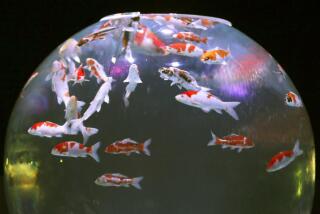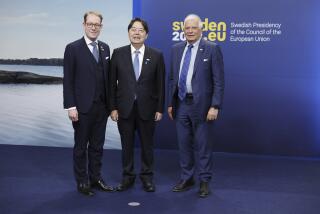WORLD PERSPECTIVE : ASIA : Japan, China Keep Quarrels Within Bounds : Tokyo administered a financial wrist slap over its neighbor’s nuclear tests. But Beijing hasn’t retaliated.
- Share via
TOKYO — Japan and China, whose relations will play a major role in determining the stability and security of Asia, are quarreling anew.
Last year, China was upset with Japan for allowing a deputy premier in the Taiwan government to attend the Asia Games in Hiroshima.
Now Tokyo is upset with Beijing for conducting its second nuclear test since Japanese Prime Minister Tomiichi Murayama appealed to Chinese President Jiang Zemin for an end to such detonations.
But rhetoric, so far, has outweighed retaliation.
“Japan proclaims itself to be anti-nuclear, but the protection it receives under the nuclear umbrella of the United States makes its protests self-contradictory,” Xu Dunxin, China’s ambassador to Tokyo, complained when he was called in by Japanese officials.
They told him that Japan was cutting aid to China in reaction to its nuclear tests. The action meant that China this year will lose $74 million or so--a mere drop in the bucket of $1.6 billion in annual Japanese aid to Beijing.
China, in turn, has taken no specific actions against Japan for what effectively was a limited Japanese penalty.
Still, this was the first time that Japan, China’s No. 1 source of aid, had used its economic assistance to express its displeasure with Beijing.
Since 1979, Japan has provided $15.4 billion in loans--at current exchange rates--to help China build infrastructure such as railways, ports and irrigation facilities.
Four years ago, Japan declared it would consider aid recipients’ military spending--especially on weapons of mass destruction--and their record on human rights when approving aid. But the Japanese imposed no penalties on China.
Conditions changed, a Japanese diplomat said, after China, France and other nuclear powers promised to exert “utmost restraint” in testing nuclear weapons as part of a global agreement to extend indefinitely the Nuclear Non-Proliferation Treaty.
*
Soon after its promise, China detonated a nuclear device.
China’s atomic tests, the latest of which took place Aug. 17, flouted the promise and “made it seem like Beijing was rushing to conduct as many tests as possible before a Comprehensive Test Ban Treaty goes into effect. That injured the feelings of the Japanese people, whose tax money is being used as grant aid,” the Japanese diplomat said.
Japan’s fundamental approach to Beijing, he added, is based on the perception of China as a nation that is beginning to open its doors to foreign countries after 200 years of suffering foreign aggression and isolation from the affairs of the world at large.
“While its door-opening efforts are still in an initial stage is not the time to pound tables in condemnation. We must encourage China to become involved in the outside world,” the diplomat said.
Such forbearance is by no means unanimous in Japan. Some critics urge the government to ignore protests from Beijing and expand exchanges with Taiwan, which China claims as part of its territory. Others advocate stiffer penalties in response to both China’s nuclear testing and its human rights record. And a few experts worry about the growth of Chinese military power.
The Japanese Foreign Ministry official predicted that more troubles will occur “as relations between our two nations deepen.” Bilateral trade, for example, is expanding so fast that China is likely to replace the United States as Japan’s No. 1 trading partner “in the not-too-distant future,” he said.
As a result, economic frictions are likely to replace debates over Japan’s wartime aggression and its relations with Taiwan as front-burner issues in bilateral relations, he predicted.
Another trouble spot is likely to occur in the two nations’ competition for influence in Asia. Tokyo grudgingly realizes that Beijing probably won’t offer what it wants most in the political sphere: China’s support for Japan assuming permanent membership in the U.N. Security Council, a status that China already enjoys, the diplomat said.
In any event, “we are not on a collision course with China,” the diplomat said. Because “Beijing is not seeking territorial expansion,” Sino-Japanese relations probably can be managed by “muddling through” for the next 10 to 20 years, he added.
More to Read
Sign up for Essential California
The most important California stories and recommendations in your inbox every morning.
You may occasionally receive promotional content from the Los Angeles Times.













